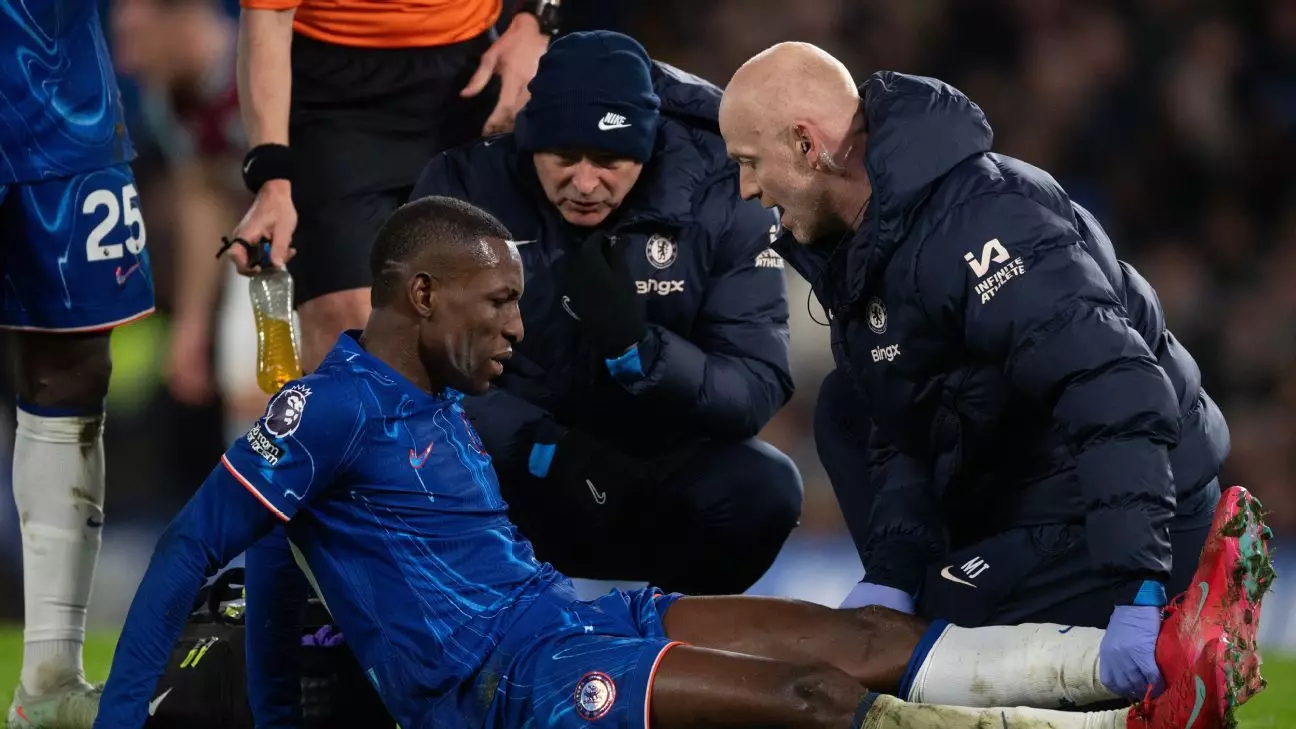As the Premier League progresses into its latter stages, Chelsea finds itself grappling with significant injury challenges that could jeopardize its competitive edge. Manager Enzo Maresca recently revealed that forward Nicolas Jackson will be sidelined until at least April due to a hamstring injury. This setback is not just a blow to Jackson’s development but presents a larger question regarding the team’s tactical framework and depth.
The news of Jackson’s injury comes after a promising start to his season, featuring nine goals in just 24 appearances. Originally anticipated to be a minor ailment, subsequent medical evaluations revealed a more severe muscular issue. Jackson’s injury, sustained during a match against West Ham, initially seemed manageable, leading to expectations of a quick recovery. However, Maresca’s confirmation that Jackson will be out for six to eight weeks adds a layer of concern for the Chelsea squad.
Maresca’s comments highlight the duality of Jackson’s presence on the field; the striker’s contributions go beyond mere goal-scoring. The void left by his absence was starkly felt during Chelsea’s recent FA Cup exit at the hands of Brighton. The team’s inability to find a straightforward replacement emphasizes how vital Jackson has become to the Blues’ attacking strategy.
In the wake of Jackson’s injury, Maresca faces an intricate tactical dilemma. The possible options include deploying Cole Palmer as a false nine, utilizing the services of Christopher Nkunku—who himself is reportedly looking to secure a move away from the club—or reshaping the formation entirely to accommodate a winger in a forward position. Each alternative comes with its own set of challenges and implications for team chemistry and performance.
Maresca’s defense of Jackson amidst ongoing criticism regarding his goal conversion rate underscores a critical point: the impact of teamwork and collaboration in enhancing an individual player’s performance cannot be overstated. His comments suggest a keen awareness that while non-strikers may offer different dynamics on the pitch, the lack of a true number nine could fundamentally alter Chelsea’s attacking prowess.
As if injuries to key players were not enough, Chelsea is also navigating a goalkeeper controversy following Maresca’s decision to replace Robert Sánchez with Filip Jørgensen in goal. Sánchez’s recent form has been less than stellar, culminating in a series of costly errors, most notably in a recent league defeat to Manchester City. By transitioning to Jørgensen, who made only his second Premier League appearance after moving from Villarreal, Maresca is seeking stability in his defense.
This positional shift is not merely a tactical necessity but also a psychological maneuver, intended to provide Sánchez with time to regroup mentally. However, it raises questions about consistency and trust within the squad, particularly as the team continues to juggle its ambitions in both league and cup competitions.
Looking forward, Chelsea’s immediate challenges go beyond the aforementioned personnel issues. Key players like Romeo Lavia and Benoît Badiashile are also expected to return from injury soon, while Wesley Fofana remains two to three weeks away from a comeback. Reece James’s availability after being rested demonstrates the importance of squad rotation, especially as fatigue becomes a factor in congested fixture periods.
As Chelsea gears up to face Brighton once again for their league encounter, the team must adapt quickly to these relentless challenges. Success in the coming matches will hinge on Maresca’s ability to integrate his fit players effectively while maintaining morale in a squad that has experienced numerous upheavals.
Chelsea is at a crossroads influenced by injuries and player performances. The managerial decisions made now will not only determine immediate results but will also shape the team’s prospects heading toward the end of the season. Adaptability and foresight will be crucial as Maresca seeks to orchestrate a cohesive unit amid these trials.

